人教版(2019)选择性必修 第一册UNIT 2 BRIDGING CULTURES复习课件(共106张PPT)
文档属性
| 名称 | 人教版(2019)选择性必修 第一册UNIT 2 BRIDGING CULTURES复习课件(共106张PPT) |  | |
| 格式 | pptx | ||
| 文件大小 | 2.2MB | ||
| 资源类型 | 教案 | ||
| 版本资源 | 人教版(2019) | ||
| 科目 | 英语 | ||
| 更新时间 | 2023-07-26 17:47:39 | ||
图片预览


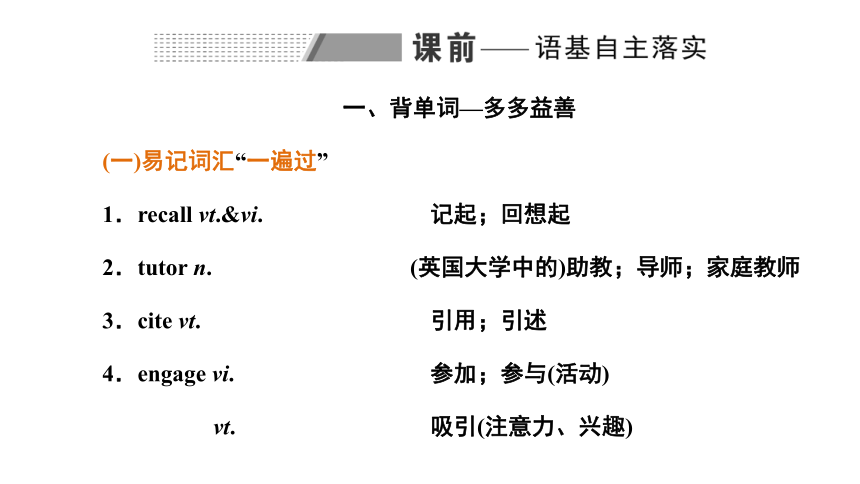
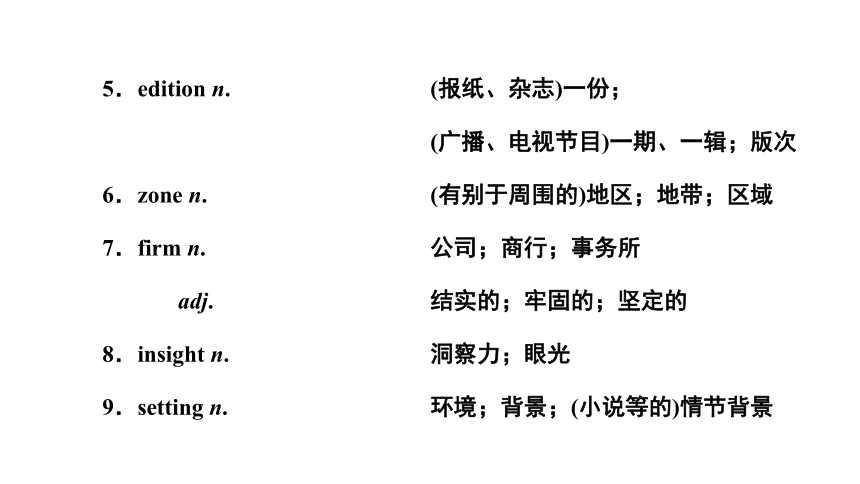

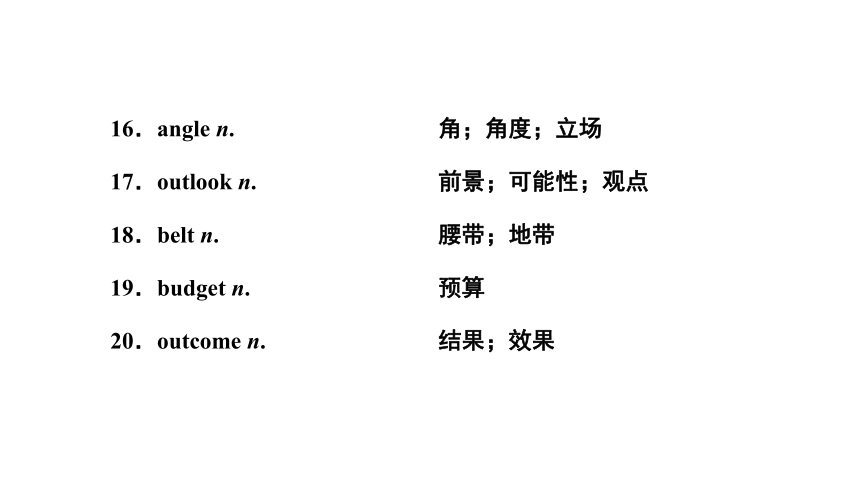
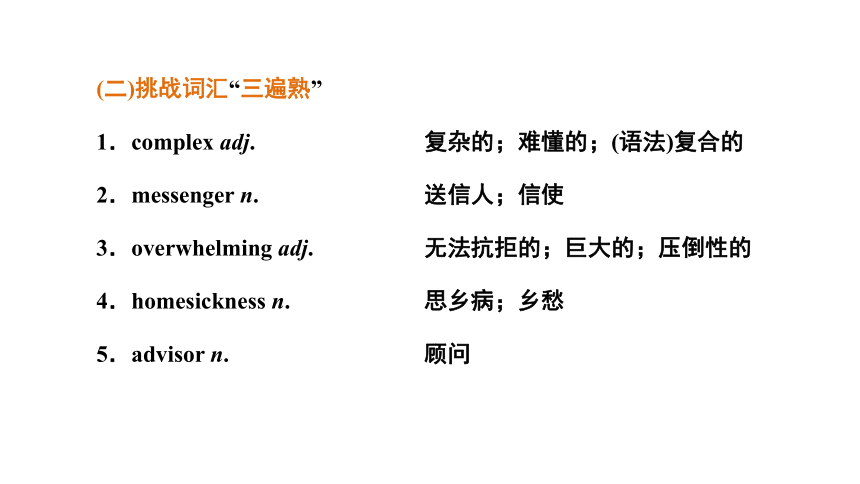
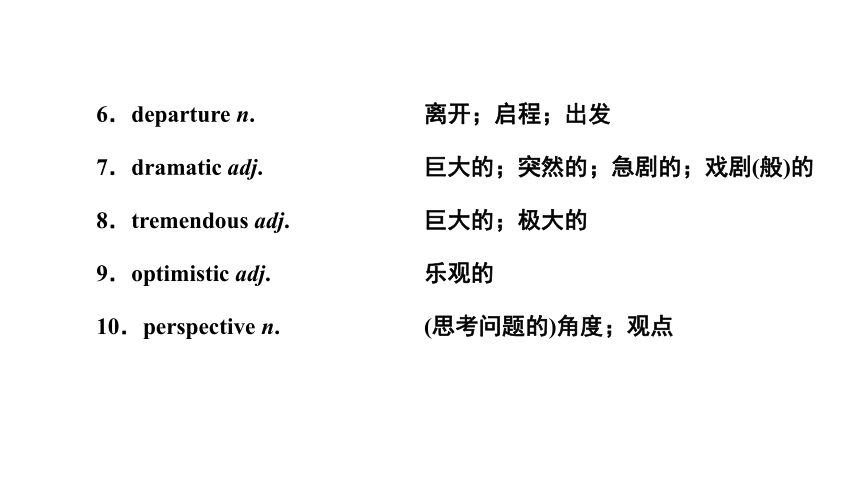
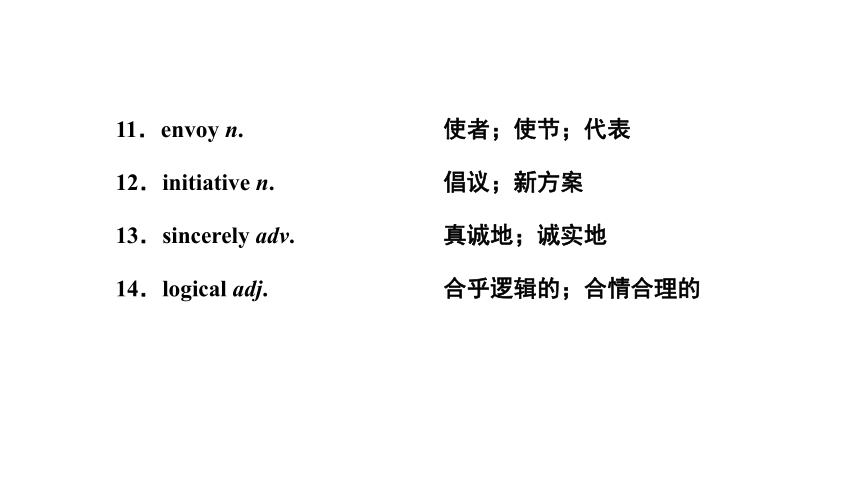
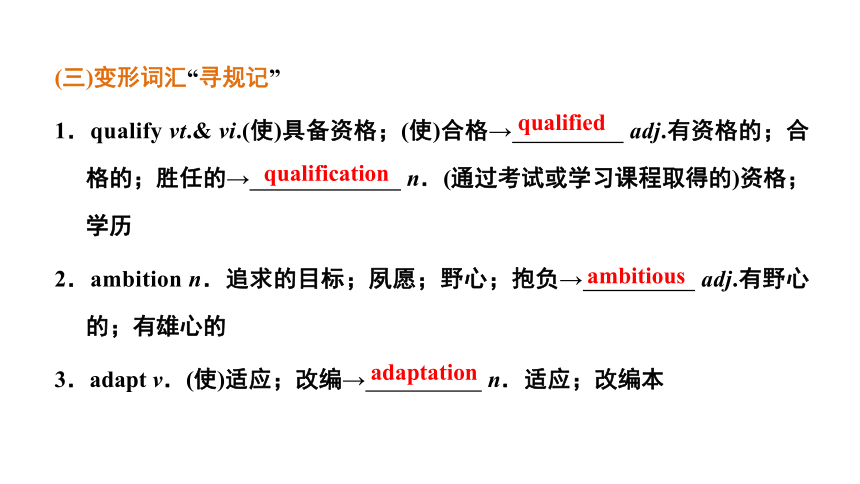
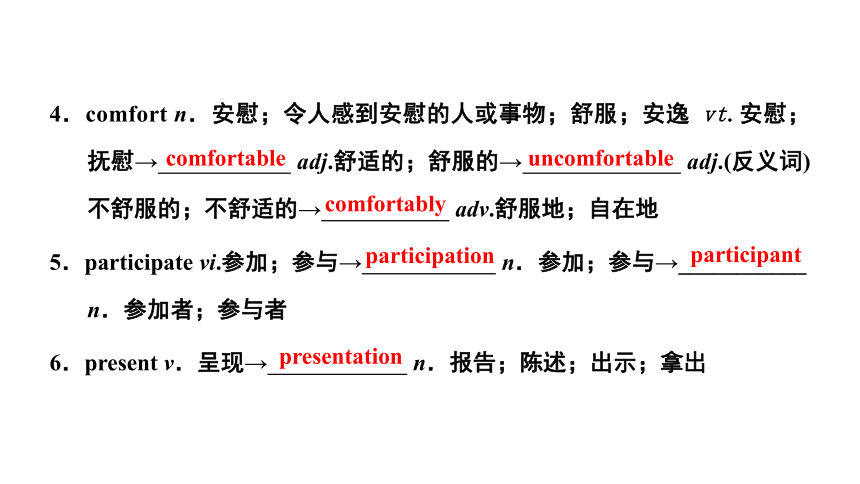
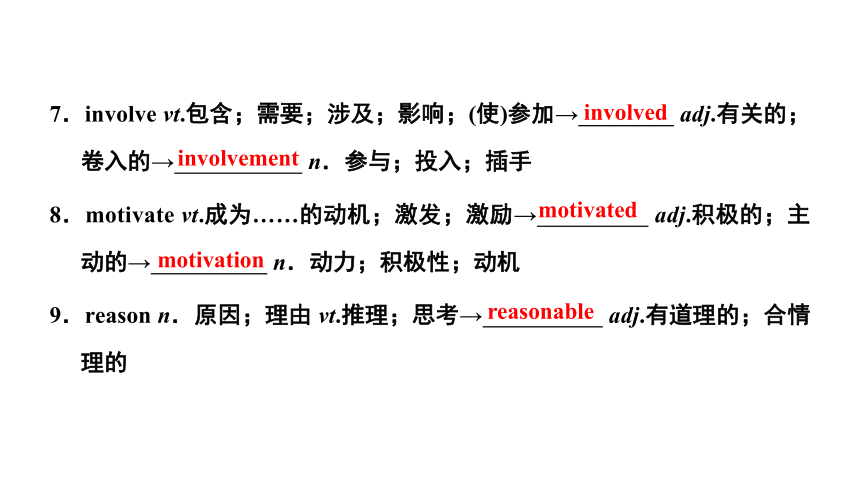
文档简介
(共106张PPT)
UNIT 2 BRIDGING CULTURES
开始
01
02
03
课前——语基自主落实
课堂——能力融会发展
课下——主题素养训练
一、背单词—多多益善
(一)易记词汇“一遍过”
1.recall vt.&vi. 记起;回想起
2.tutor n. (英国大学中的)助教;导师;家庭教师
3.cite vt. 引用;引述
4.engage vi. 参加;参与(活动)
vt. 吸引(注意力、兴趣)
5.edition n. (报纸、杂志)一份;
(广播、电视节目)一期、一辑;版次
6.zone n. (有别于周围的)地区;地带;区域
7.firm n. 公司;商行;事务所
adj. 结实的;牢固的;坚定的
8.insight n. 洞察力;眼光
9.setting n. 环境;背景;(小说等的)情节背景
10.grasp vt. 理解;领会;抓紧
11.expense n. 费用;花费;开销
12.mature adj. 成熟的
13.boom vi.&n. 迅速发展;繁荣
14.deny vt. 否认;否定;拒绝
15.gain vt. 获得;赢得;取得;增加
n. 好处;增加
16.angle n. 角;角度;立场
17.outlook n. 前景;可能性;观点
18.belt n. 腰带;地带
19.budget n. 预算
20.outcome n. 结果;效果
(二)挑战词汇“三遍熟”
1.complex adj. 复杂的;难懂的;(语法)复合的
2.messenger n. 送信人;信使
3.overwhelming adj. 无法抗拒的;巨大的;压倒性的
4.homesickness n. 思乡病;乡愁
5.advisor n. 顾问
6.departure n. 离开;启程;出发
7.dramatic adj. 巨大的;突然的;急剧的;戏剧(般)的
8.tremendous adj. 巨大的;极大的
9.optimistic adj. 乐观的
10.perspective n. (思考问题的)角度;观点
11.envoy n. 使者;使节;代表
12.initiative n. 倡议;新方案
13.sincerely adv. 真诚地;诚实地
14.logical adj. 合乎逻辑的;合情合理的
(三)变形词汇“寻规记”
1.qualify vt.& vi.(使)具备资格;(使)合格→ adj.有资格的;合格的;胜任的→ n.(通过考试或学习课程取得的)资格;学历
2.ambition n.追求的目标;夙愿;野心;抱负→ adj.有野心的;有雄心的
3.adapt v.(使)适应;改编→ n.适应;改编本
qualified
qualification
ambitious
adaptation
4.comfort n.安慰;令人感到安慰的人或事物;舒服;安逸 vt.安慰;抚慰→ adj.舒适的;舒服的→ adj.(反义词)不舒服的;不舒适的→ adv.舒服地;自在地
5.participate vi.参加;参与→ n.参加;参与→___________ n.参加者;参与者
6.present v.呈现→ n.报告;陈述;出示;拿出
comfortable
uncomfortable
comfortably
participation
participant
presentation
7.involve vt.包含;需要;涉及;影响;(使)参加→ adj.有关的;卷入的→ n.参与;投入;插手
8.motivate vt.成为……的动机;激发;激励→ adj.积极的;主动的→ n.动力;积极性;动机
9.reason n.原因;理由 vt.推理;思考→ adj.有道理的;合情理的
involved
involvement
motivated
motivation
reasonable
10.expect v.预料;等待;期待→ n.期望;预期;期待
11.apply v.申请;应用;使用→ n.申请;申请书;应用→_________ n.申请人
12.expose vt.使接触;使体验;显露;使暴露于(险境) → n.接触;体验;暴露;揭露
expectation
application
applicant
exposure
13.behave vt.表现vi.&vt.表现得体;有礼貌→ n.行为;举止
14.surround v.包围;环绕→ adj.周围的;附近的→_____________ n.[pl.]环境;周围的事物
15.depress vt.使沮丧;使忧愁→ adj.沮丧的;意志消沉的→ __________n.抑郁;沮丧
behavior
surrounding
surroundings
depressed
depression
16.strong adj.强壮的;坚强的;结实的→ n.强项;长处;力量→ vi.&vt.加强;增强;巩固
17.competent adj.有能力的;称职的→ n.能力;胜任;本领
18.cooperate vi.合作;协作;配合→ n.合作;协作
strength
strengthen
competence
cooperation
(四)联想词汇“一线牵”
1.-ous后缀形容词分辨清
①ambitious 有雄心的
②dangerous 危险的
③cautious 小心的;谨慎的
④humorous 幽默的
⑤poisonous 有毒的
⑥mountainous 多山的
2.多变“环境”要适应
①surroundings n. 环境
②circumstance n. 环境;状况
③settings n. 环境;背景
④environment n. 环境
⑤situation n. 环境特点;状况
⑥condition n. 条件;环境;状况
二、背词块—丰富表达
1. 建立;设立
2. 轮流做某事
3. 参加;参与
4. 大声点说;明确表态
5. 舒服自在;不拘束
set up
take turns to do sth.
participate in
speak up
feel at home
6. 参与;卷入;与……有关联
7. 首先
8. 导致;有助于
9. 和……合作
10. 支持;站在……的一边
get involved in
to begin with
contribute to
cooperate with
side with
11. 据我所知
12. 就我而言;依我看来
13. 总的来说;总之
14. 一般来说
as far as I know
as far as I am concerned
in summary
generally speaking
[联想串记]
1.set的相关短语
set up 建立;设立
set about 动身;出发
set out 动身;出发;摆放
set down 写下;记下;让某人下车
set off 出发;动身;引起;使爆炸
2.名词turn的相关短语
take turns to do sth. 轮流做某事
by turns 依次;轮流
in turn 相应地;转而;依次;轮流
it's one's turn to do sth. 轮到某人做某事
3.speak的相关短语
speak up 大声点说;明确表态
speak out 公开表白;大胆说出
speak highly of 高度赞扬
speak of 谈到;论及
三、背好句好段—增分写作
(一)背好句—有“话”好好说
1.It is/was the first/second ...time (that)句型
教材原句 It was the first time that she had left China.
这是她第一次离开中国。
推荐佳句 ①(2022·新高考Ⅱ卷写作)This is my first time that I have invited you to attend our program —Talk and Talk.
这是我第一次邀请你参加我们的节目——Talk and Talk。
推荐佳句 ②(新教材北师大版选择性必修2佳句)It was the first time Helen had understood such a complex word — a word for something she couldn't touch.
那是海伦第一次明白复杂词语的意思,一个她触摸不到的抽象词语。
续表
2.疑问词+不定式
教材原句 “I didn't know what to expect,” Xie Lei recalled.
“我不知道会发生什么。”谢蕾回忆道。
推荐佳句 ①(2020·全国卷Ⅰ书面表达)She teaches us not only how to gain knowledge but also how to behave well.
她不仅教给我们如何获得知识,而且教我们如何行为得体。
②(新教材译林版必修3佳句)Mrs Archer, what are your thoughts on how to deal with pollution
阿彻女士,您对如何处理污染问题有何见解?
3.be to do
教材原句 “My ambition is to set up a business in China after graduation,”
she explained.
“我的志向是毕业后在中国创办一家企业。”她解释道。
推荐佳句 ①(2022·全国甲卷书面表达)To protect oceans is to protect ourselves.
保护海洋就是保护我们自己。
②(新教材外研版必修1佳句)The next morning I was to start for the West to make my fortune.
第二天一早我就要去西部赚大钱了。
4.do 表示强调
教材原句 A final point to consider is that while studying abroad does have potential benefits, young people who study in China also have a great future to look forward to!
最后要考虑的一点是:尽管留学有诸多潜在的益处,但是在中国读书的年轻人同样未来可期!
推荐佳句 ①(2021·全国甲卷书面表达)Guzheng does mean great importance to Chinese folk music, leading you to a fantastic world of music.
古筝的确对中国民族音乐很重要,将你带入一个美妙的音乐世界。
②(新教材译林版必修2佳句)But, I do remember the first time I heard the sweetest voice in the wide world.
但是,我清楚地记得我第一次听到全世界最甜美的声音时的情景。
续表
(二)背好段—有“情”慢慢聊
情感表达之“愤怒”
My inner anger was like a growing monster, uncontrollably driving me to the edge of madness. Before I realized it, I was sobbing in my sister's room, with bullets of words firing through my mouth, expressing my long-buried dissatisfaction towards her absence from my snow shoveling experiences. The house seemed to be holding its breath when I stopped my accusation, still weeping.
我内心的愤怒就像一个不断增长的怪物,不受控制地把我逼到了疯狂的边缘。在我意识到它之前,我正在姐姐的房间里抽泣,像子弹一样的话语从我的口中射出,表达着藏在我心里很久的对她缺席我铲雪经历的不满。当我停止控诉仍然在哭泣时,整座房子似乎都在屏住呼吸。
[点评] 本段中使用了“like a growing monster”与“with bullets of words firing through my mouth”两处比喻的修辞手法和“uncontrollably driving me to the edge of madness”夸张的修辞手法,形象地刻画了作者内心极大的愤怒。常用的描写人物愤怒的词汇有:anger, annoy, irritate, furious, with anger, be angry with sb.等。
四、语基课前自查——摸底训练
Ⅰ.单词拼写
1.Then I (回想起) good times spent with Amy and how she managed to help me out whenever I was in trouble.
2.Nowadays, many people rarely (参加) in regular exercise.
3.These texts give the readers an (洞察力) into the Chinese mind.
recalled
engage
insight
4.Taking a deep breath, Louise stepped forward and (抓住) the hands of Pisano tightly.
5.With food our biggest weekly household (花费), Susanna and Matt spend time with a different family each week.
6.(2020·全国卷Ⅲ)After a while, she apologized for the way she_________ (表现) at the beginning.
7.We knew we both wanted to be in each other's company. We promised to grow (成熟的) and let it not affect our friendship.
grasped
expense
behaved
mature
8.She was always curious about my life and (乐观的) about everything she faced though she had a rare disease.
9.(2021·天津高考)Meanwhile, the kids have (获得) a sense of accomplishment.
10.After hearing this satisfactory (结果), Steve felt a sense of joy and happiness surging through him.
optimistic
gained
outcome
Ⅱ.单句语法填空
1.I'm a Senior 3 student in Hongxing Middle School, and I believe I am________ (qualify) for the position.
2.(2021·新高考Ⅰ卷)Millions of waterfowl (水禽) were killed at the hands of market hunters and a handful of overly (ambition) sportsmen.
3.Many businesses started up by college students have taken off thanks to the (comfort) climate for business creation.
qualified
ambitious
comfortable
4.Your (participate) is highly anticipated and appreciated!
5.There are plenty of opportunities for the creative person to become________(involve), including workshops and events.
6.With high (motivate) and enthusiasm, we can keep on learning.
participation
involved
motivation
7.The beauties of the West Lake in spring were beyond his____________ (expect).
8.The more we're (expose) to the good and the bad, the better we are at telling the difference.
9.The village itself is pretty, but the (surround) countryside is rather dull.
expectation
exposed
surrounding
10.To avoid knee pain, you can run on soft surfaces, do exercises to___________ (strength) your leg muscles (肌肉), avoid hills and get good running shoes.
11.(2020·天津高考)Loneliness is a serious social problem that can contribute to (depress) and even crimes.
12.Childhood activities help a child develop responsibility, independence, confidence and (competent).
strengthen
depression
competence
Ⅲ.选词填空
1.Above all, if you are having any technical difficulty.
2.The Chinese family go out of their way to make you .
3.No matter what you determine to do, I would your decision.
participate in/get involved in, speak up, feel at home, side with, generally speaking,as far as I am concerned, contribute to, cooperate with
speak up
feel at home
side with
4.Working in small groups is a good way to learn how to_______________ others.
5.As is known to all, honesty and hard work success and happiness.
6. ,I think private cars have more advantages than disadvantages.
cooperate with
contribute to
As far as I am concerned
7.The warmer a place is, ,the more types of plants and animals it will usually support.
8.I sincerely invite you to the “National Day” English speaking competition, serving as a judge.
generally speaking
participate in/get involved in
Ⅳ.多维表达
1.(完成句子)这是他第一次全心全意地接受他的第二个家。(it was the first time that)
wholeheartedly accepted his second home.
2.(完成句子)他只上了六年学,他当时的抱负是当一名海员。(be to do)
He had only six years of schooling, and_____________________________
.
It was the first time that he had
his ambition was to become a
sailor
3.(一句多译)当我们走出洞穴时,我们知道自己得救了。
① ,we knew we were saved.(一般表达)
② ,we knew we were saved.(状语从句的省略)
4.(一句多译)她两眼发直,不知道下面该说什么。
①She stared blankly into space, not knowing .(宾语从句)
When we walked out of the cave
When walking out of the cave
what she would say next
②She stared blankly into space, not knowing .(疑问词+不定式)
5.I really hope these tips can help improve your learning of a foreign language.
→I these tips can help improve your learning of a foreign language.(强调谓语)
what to say next
do hope
中档保分词汇—自查自纠无盲点
1.comfort n.安慰;令人感到安慰的人或事物;舒服;安逸vt.安慰;抚慰
(单句语法填空)
①My parents have been great comfort to me in my difficult times all of this.
a
②She comforted herself the thought that it would soon be spring.
③(2022·全国甲卷)The more time you spend in any given country,the more ___________(comfort)you'll begin to feel with its foreign cultural practices.
④(2022·新高考Ⅰ卷)He was (comfortable),and his crying let the whole campground know it.
with
comfortable
uncomfortable
系统归纳 (1)be a comfort to sb. 对某人来说是个安慰
in comfort 舒适地
(2)comfort sb.with sth. 用某物安慰某人
(3)comfortable adj. 舒适的;舒服的
uncomfortable adj. 不舒服的;不舒适的
2.involve vt.包含;需要;涉及;影响;(使)参加
?单句语法填空/完成句子
①All who participated have gained a positive outcome from getting_______ (involve).
②(2022·全国甲卷书面表达) ,the better the ocean environment is.
参与的人越多,海洋环境就越好。
involved
The more people are involved
?一句多译
(2020·新高考Ⅰ卷写作) 来自各个年级的200名学生参加了这次赛跑。
③ ______________________________________________________________
(involve oneself in ...)
④ (get/be involved in)
200 students from all grades involved themselves in this running race.
200 students from all grades were/got involved in this running race.
系统归纳 (1)involve (doing) sth. 包含/需要(做)某事
(2)involved adj. 有关联的;卷入的
be/get involved in 参与;卷入; 与……有关联;专注于
微点提醒 involve oneself in sth.=get/be involved in sth. 参加某事
3.participate in参加;参与
(单句语法填空/完成句子)
①(2021·全国乙卷)The researchers examined various levels of noise on___________ (participate) as they completed tests of creative thinking.
②You should participate your friend in his sufferings.
③Your (participate)can surely add color to our trip and we are all looking forward to your involvement.
participants
with
participation
④(2022·新高考Ⅰ卷读后续写)He always to the best of his ability whatever they were doing.
无论他们在做什么,他总是尽全力参与。
⑤(2021·新高考Ⅰ卷写作)I sincerely hope that Youth can make new progress and that the interaction and share their own stories.
我真诚地希望Youth能取得新的进步,并且会有更多的读者参与互动,分享他们自己的故事。
participated
in
more readers will participate in
系统归纳 (1)participate in (doing) sth.with sb. 与某人一起参与(做)某事
participate with sb.in sth. 与某人一起分担某事
(2)participant n. 参加者
participation n. 参加;参与;分担
微点提醒 表示“参加”的短语:
take part in, engage in, join in等。
教材基础语法—再认再现基础牢
1.主语从句
(单句语法填空/完成句子)
①It is assumed, for a person to be healthy, yin and yang forces should be in balance.Imbalance can cause illness or injury.
② followed was tireless work by Shi and his team, planting several species of drought-enduring trees over sand.
that
What
③ Mike didn't turn up at the meeting yesterday is unknown.
④ is that she puts students before herself and that her happiness lies in helping others.
张桂梅给我印象最深的是她把学生放在自己之前,她的幸福在于帮助别人。
Why
What Zhang Guimei impresses me most
2.宾语从句
(单句语法填空/完成句子)
①The art emphasizes simplicity, and the arranger must decide on is truly necessary in his or her work and life.
②Time stood still as the bear and I both waited to see would move first.
③She asked me I had returned the books to the library, and I admitted that I hadn't.
what
who
whether
④You have to know you're going if you are to plan the best way of getting there.
⑤The doctor advised and get into the good habit of getting up early.
医生建议我们要均衡饮食,并养成早起的好习惯。
where
that we should have a balanced diet
3.表语从句
(单句语法填空/完成句子)
①I had neither a computer nor newspaper.That's I don't know the latest news.
②I'd like to start my own business — that's I'd do if I had money.
why
what
③And another big obstacle is the majority doesn't yet have a mental picture of the possible pathways forward.
④That's the trip along the Yangtze River will be a better choice.
那就是为什么我觉得长江之旅会是一个更好的选择。
that
why I think
4.同位语从句
(单句语法填空/完成句子)
①People used to hold the belief the earth was the center of the universe.
②The suggestion students should be given more free time is welcomed by many people.
③The question we should call in a specialist was answered by the family doctor.
that
that
whether
④We haven't yet settled the question we are going to spend our summer vacation.
⑤In a word, I hold a firm belief _____________________________________
.
总之,我坚信你会考虑我的建议。
where
that you will take my advice into
consideration
[谨记规则]
名词性从句可分为主语从句、宾语从句、表语从句和同位语从句。名词性从句要用陈述语序。从属连词: that, whether, if在从句中不充当任何成分,只起连接作用; 连接代词: who,whose,whom,what,which,whatever,whoever等有词义,在从句中担任成分,如主语、表语、宾语或定语等;连接副词: when, where, how, why, whenever等,有词义,在从句中担任成分,作状语。
(1)主语从句 :在复合句中作主语, 它可以直接放句首, 也可用it作形式主语,将主语从句放在句末。
(2)宾语从句:在复合句中作宾语,位于及物动词、介词和形容词之后。
(3)表语从句:在复合句中作表语,放在连系动词之后。
(4)同位语从句: 位于一个抽象名词后,对其进行解释说明。常见的抽象名词有:fact, news, message, information, idea, proposal, belief, thought, answer, reply等。
复杂多变词汇—条分缕析逐点清
1.qualify vt.& vi.(使)具备资格;(使)合格
常见考法 (1)qualify sb.to do sth. 使某人有资格做某事
qualify (sb.) for 使(某人)具备资格
(2)qualified adj. 有资格的;合格的;胜任的
qualification n. (通过考试或学习课程取得的)资格;学历
升维考法 be qualified for (doing) sth./to do sth.
=have qualifications for (doing) sth./to do sth.有资格做某事
?精练常见考法(单句语法填空)
①Another challenge for more than a million of the most (qualify) farm workers and managers is a non-existent path to citizenship.
②He's been informed that he doesn't qualify the scholarship because of his academic background.
qualified
for
?细练升维考法(一句多译)
他们中只有百分之二的人有资格做这种技术性的工作。
③Only two percent of them the skilled work.(qualified)
④Only two percent of them the skilled work.(qualification)
are qualified for
have qualifications for
2.engage vi.参加;参与(活动)vt.吸引(注意力、兴趣)
常见考法 (1)engage in (使)从事;参与
engage sb.in sth. 使某人加入/忙于某事
engage sb.to do sth. 雇用某人做某事
(2)be engaged in sth. 忙于某事
be engaged to sb. 与某人订婚
升维考法 注意区分be engaged in“忙于;从事于”与be engaged to
“与……订婚”的介词搭配。
?精练常见考法(单句语法填空)
①That gets people more (engage) in the experience, and they tend to enjoy it more.
②The program aims to encourage students to engage themselves making a difference in society.
③Her father engaged a tutor (improve) her maths.
engaged
in
to improve
?细练升维考法(一句多译)
从大学里受益最多的是那些完全投入学术生活的学生。
④The students benefiting most from college are those who_____________ __________academic life.
⑤The students benefiting most from college are those___________________ academic life.(非谓语动词作定语)
are totally
totally engaged in
engaged in
3.expose vt.使接触;使体验;显露;使暴露于(险境)
常见考法 expose ...to ... 使……暴露于/遭受……
be exposed to 暴露于;接触
升维考法 expose ...to ...中,及物动词expose后若无宾语,则常常使用它的被动形式。(be) exposed to ...“暴露于……”。
?精练常见考法(单句语法填空/完成句子)
①(2021·全国乙卷)The participants in the 70 decibels group — those________ (expose) to a level of noise similar to background chatter in a coffee shop — significantly outperformed the other groups.
②(2020·全国卷Ⅱ)“Nicolo,” whose real name cannot (expose) to the public because of Italy's privacy laws, finished working the whole night at a factory in Turin.
exposed
be exposed
③Schools should more excellent traditional Chinese customs.
学校应该让孩子们多接触优秀的中国传统习俗。
expose children to
?细练升维考法(句式升级)
④If you expose yourself to the sunlight for too long, you will get your skin harmed.
→ the sunlight for too long, you will get your skin harmed.(现在分词短语作状语)
→ the sunlight for too long, you will get your skin harmed.(过去分词短语作状语)
Exposing yourself to
Exposed to
经典增分句式—学通用活表达美
1.It is/was the first/second ...time (that) ...句型
(1)“It/This/That+was+the first/second ...time (that)+过去完成时”表示“第一/第二……次……”。
(2)“It/This/That+is+the first/second ...time (that)+现在完成时”表示“第一/第二……次……”。
(3)It is/was (about/high) time (that) ...should do sth./did sth.意为“到了该做某事的时间了”,相当于It is/was time for sb.to do sth.。
?通过题点训练明确规则用法(完成句子/一句多译)
①I was amazed, thrilled and grateful.It was the first time that I .
我感到惊讶、激动和感激。这是我第一次得奖。
②It is the first time that I something in English in my blog.
这是我第一次有勇气在我的博客上用英语写一些东西。
had ever won a prize
have the courage to write
③现在是我们采取有效措施保护森林的时候了。
→It is time for us .
→It is time that .
to take effective measures to protect forests
we should take/took effective measures to protect forests
?通过句子仿写做到学通写美
④(2022·全国甲卷书面表达) 总之,现在是我们致力于保护海洋的时候了。
All in all,________________________________________________________
.
⑤这是自从我的小妹妹进入这个家庭以来,我第一次微笑。
since my little baby sister came into the family.
it is high time that we devoted/should devote ourselves to
It was the first time that I had smiled
protecting oceans
2.“疑问词+不定式”结构
(1)“疑问词+不定式(短语)”的作用相当于一个名词性从句,通常在某些动词(如tell, know, imagine, learn等)后面作宾语,有时也用作主语、表语、同位语等。
(2)疑问词why后面不能接带to的不定式。
?通过句式变换明晰句式结构
①We learned how we could create and register a new web page.
→We learned and register a new web page.
②I am not sure how I should behave at the dinner table.
→I am not sure at the dinner table.
how to create
how to behave
?通过句子仿写做到学通写美
③(2022·新高考Ⅰ卷) 我想给她买个好礼物,但我不知道该选什么。
I'm trying to get her a good gift, but I don't know .
④(2022·新高考Ⅰ卷)我们很幸运地从一些著名运动员那里得到了关于如何提高我们的技能和强身健体的好建议。
We've been fortunate to have got good advice from some famous athletes .
what to choose
on how to improve our skills and build up our body
3.be to do
(1)表示按照计划或根据安排将要做某事;
(2)表示命令、义务、职责等,可译作“应该做某事,必须做某事”;
(3)表示不可避免将要发生的事或命中注定的事;
(4)如果主语是以aim, duty, hope, idea, happiness, job, plan, problem, purpose, thing等为中心的名词或what引导的名词性从句时,不定式作表语是对主语进行补充说明。
?通过题点训练明确规则用法(单句语法填空)
①Every member of the party was (pay)his own expense.
②(2020·新高考全国卷Ⅰ)The objective of most speeches is_________ (benefit) the audience.
③They are (pay) a visit to the teacher together at 10 am tomorrow.
to pay
to benefit
to pay
?通过句子仿写做到学通写美
④(2022·全国甲卷书面表达)首先,我们能做的事情就是重视我们的日常行为。
First of all,what we can do is our daily actions.
⑤这场比赛是为了帮助我们与友好学校交流,增进友谊。
The match and improve our friendship.
to place importance on
is to help us communicate with our friend schools
2021·浙江6月高考·阅读理解C篇
If you ever get the impression that your dog can “tell” whether you look content or annoyed, you may be onto something.Dogs may indeed be able to distinguish between happy and angry human faces, according to a new study.
Researchers trained a group of 11 dogs to distinguish between images (图像) of the same person making either a happy or an angry face.During the training stage, each dog was shown only the upper half or the lower half of the person's face.The researchers then tested the dogs' ability to distinguish between human facial expressions by showing them the other half of the person's face or images totally different from the ones used in training.The researchers found that the dogs were able to pick the angry or happy face by touching a picture of it with their noses more often than one would expect by random chance.
The study showed the animals had figured out how to apply what they learned about human faces during training to new faces in the testing stage. “We can rule out that the dogs simply distinguish between the pictures based on a simple cue, such as the sight of teeth,” said study author Corsin Müller. “Instead,our results suggest that the successful dogs realized that a smiling mouth means the same thing as smiling eyes, and the same rule applies to an angry mouth having the same meaning as angry eyes.”
“With our study, we think we can now confidently conclude that at least some dogs can distinguish human facial expressions,” Müller told Live Science.
At this point, it is not clear why dogs seem to be equipped with the ability to recognize different facial expressions in humans. “To us, the most likely explanation appears to be that the basis lies in their living with humans, which gives them a lot of exposure to human facial expressions,” and this exposure has provided them with many chances to learn to distinguish between them, Müller said.
[真题再做]
语篇解读:本文是一篇说明文。文章主要介绍了一项有关狗的研究。实验研究表明,狗能够识别人类的面部表情是高兴还是愤怒。
1.The new study focused on whether dogs can .
A.distinguish shapes
B.make sense of human faces
C.feel happy or angry
D.communicate with each other
答案:B
解析:推理判断题。根据第一段第二句可知,一项新的研究表明,狗可能真的可以辨别人的面部表情是高兴还是愤怒。下文详细介绍了研究过程和结论:狗能够识别人的面部表情。倒数第二段中的“With our study, we think we can now confidently conclude that at least some dogs can distinguish human facial expressions”一句明确给出了结论。
2.What can we learn about the study from paragraph 2
A.Researchers tested the dogs in random order.
B.Diverse methods were adopted during training.
C.Pictures used in the two stages were different.
D.The dogs were photographed before the test.
答案:C
解析:细节理解题。根据第二段中的“The researchers then tested ... used in training.”可知,研究人员给狗展示了人的另一半面部或与训练中使用的完全不同的图像。由此可知,在两个测试阶段,狗看到的照片是不一样的。
3.What is the last paragraph mainly about
A.A suggestion for future studies.
B.A possible reason for the study findings.
C.A major limitation of the study.
D.An explanation of the research method.
答案:B
解析:段落大意题。根据最后一段第一句可知,本段主要探讨狗具备识别人类表情的能力的原因。下文给出了具体解释:狗与人类居住在一起,有很多机会接触到人类的表情,这种接触使狗学会辨别人类的面部表情。
[素养发掘]
一、由典题悟通法
段落大意题的思维建模(第3题)
二、由语篇积词汇
1.因境辨义(写出下列蓝体词在文中的意思)
①(熟词生义)If you ever get the impression that your dog can “tell” whether you look content or annoyed, you may be onto something._____
②(一词多义)Dogs may indeed be able to distinguish between happy and angry human faces, according to a new study._____
③(熟词生义)To us, the most likely explanation appears to be that the basis lies in their living with humans, which gives them a lot of exposure to human facial expressions ... ;_____
辨别
表情
似乎
接触
2.词块积累(写出下列词块的汉语意思)
①facial expressions _________
②be onto something _________
③distinguish between ___________
④in the testing stage ___________
⑤rule out _______________
面部表情
有些想法
辨别;分辨
在测试阶段
把……排除在外
⑥be based on _____________
⑦apply to ______________
⑧at this point _____________
⑨be equipped with _____________
⑩lie in ____
provide sb. with sth. _______________
以……为基础
适用于;应用于
目前,在这时
具备;配备着
在于
为某人提供某物
三、寻结构破长句
1.The study showed the animals had figured out how to apply what they learned about human faces during training to new faces in the testing stage.
抓标志:被省略的连接词that;连接词_____
判类型:主句+宾语从句(含有一个宾语从句)
试翻译:研究表明,这些动物已经知道如何将_____________________
应用到测试阶段的新表情上。
what
它们在训练中学到的关
于人类表情的知识
2.Instead, our results suggest that the successful dogs realized that a smiling mouth means the same thing as smiling eyes, and the same rule applies to an angry mouth having the same meaning as angry eyes.
抓标志:并列连词 ;连接词_________
判类型:复合句(宾语从句里含有一个宾语从句)+并列连词+简单句(含有分词短语作定语)
试翻译:相反,我们的结果表明,成功的狗意识到 ,且同样的规则适用于有着相同含义的愤怒的嘴和愤怒的眼睛。
and
that; that
微笑的嘴和微笑的眼睛意味着同样的情形
四、赏佳句助写作
1.(赏结构之美)Researchers trained a group of 11 dogs to distinguish between images of the same person making either a happy or an angry face.
赏析:句中动词不定式短语to distinguish between images of the same person作目的状语;现在分词短语making either a happy or an angry face作定语,修饰名词person。两个非谓语动词短语的使用,使得句子结构紧凑,表意丰富。
[对点练——完成句子]
① ,I read a lot of books_________________
.
为了在这次演讲比赛中表现得好,我翻看了很多讲述演讲技巧的书。
②He often goes to the club from his classmates____________
.
他经常去俱乐部向学习音乐专业的同学寻求建议。
To do well in the speech contest
telling about speech
to seek advice
skills
majoring in
music
2.(赏用词之美)Dogs may indeed be able to distinguish between happy and angry human faces, according to a new study.
赏析:本句运用distinguish(区分;辨别)明确说明了狗区分开心和生气表情的能力,而且indeed(的确),be able to(有能力……)和情态动词may(可能)的使用,使得表达客观,引发读者的阅读兴趣。
3.(赏意境之美)The researchers found that the dogs were able to pick the angry or happy face by touching a picture of it with their noses more often than one would expect by random chance.
赏析:狗用鼻子触碰画面,来选出生气或者开心的表情。此句用生动形象极具画面感的场景说明了实验结果。
“课时跟踪检测”见“课时跟踪检测(二)”
(单击进入电子文档)
谢
谢
观
看
UNIT 2 BRIDGING CULTURES
开始
01
02
03
课前——语基自主落实
课堂——能力融会发展
课下——主题素养训练
一、背单词—多多益善
(一)易记词汇“一遍过”
1.recall vt.&vi. 记起;回想起
2.tutor n. (英国大学中的)助教;导师;家庭教师
3.cite vt. 引用;引述
4.engage vi. 参加;参与(活动)
vt. 吸引(注意力、兴趣)
5.edition n. (报纸、杂志)一份;
(广播、电视节目)一期、一辑;版次
6.zone n. (有别于周围的)地区;地带;区域
7.firm n. 公司;商行;事务所
adj. 结实的;牢固的;坚定的
8.insight n. 洞察力;眼光
9.setting n. 环境;背景;(小说等的)情节背景
10.grasp vt. 理解;领会;抓紧
11.expense n. 费用;花费;开销
12.mature adj. 成熟的
13.boom vi.&n. 迅速发展;繁荣
14.deny vt. 否认;否定;拒绝
15.gain vt. 获得;赢得;取得;增加
n. 好处;增加
16.angle n. 角;角度;立场
17.outlook n. 前景;可能性;观点
18.belt n. 腰带;地带
19.budget n. 预算
20.outcome n. 结果;效果
(二)挑战词汇“三遍熟”
1.complex adj. 复杂的;难懂的;(语法)复合的
2.messenger n. 送信人;信使
3.overwhelming adj. 无法抗拒的;巨大的;压倒性的
4.homesickness n. 思乡病;乡愁
5.advisor n. 顾问
6.departure n. 离开;启程;出发
7.dramatic adj. 巨大的;突然的;急剧的;戏剧(般)的
8.tremendous adj. 巨大的;极大的
9.optimistic adj. 乐观的
10.perspective n. (思考问题的)角度;观点
11.envoy n. 使者;使节;代表
12.initiative n. 倡议;新方案
13.sincerely adv. 真诚地;诚实地
14.logical adj. 合乎逻辑的;合情合理的
(三)变形词汇“寻规记”
1.qualify vt.& vi.(使)具备资格;(使)合格→ adj.有资格的;合格的;胜任的→ n.(通过考试或学习课程取得的)资格;学历
2.ambition n.追求的目标;夙愿;野心;抱负→ adj.有野心的;有雄心的
3.adapt v.(使)适应;改编→ n.适应;改编本
qualified
qualification
ambitious
adaptation
4.comfort n.安慰;令人感到安慰的人或事物;舒服;安逸 vt.安慰;抚慰→ adj.舒适的;舒服的→ adj.(反义词)不舒服的;不舒适的→ adv.舒服地;自在地
5.participate vi.参加;参与→ n.参加;参与→___________ n.参加者;参与者
6.present v.呈现→ n.报告;陈述;出示;拿出
comfortable
uncomfortable
comfortably
participation
participant
presentation
7.involve vt.包含;需要;涉及;影响;(使)参加→ adj.有关的;卷入的→ n.参与;投入;插手
8.motivate vt.成为……的动机;激发;激励→ adj.积极的;主动的→ n.动力;积极性;动机
9.reason n.原因;理由 vt.推理;思考→ adj.有道理的;合情理的
involved
involvement
motivated
motivation
reasonable
10.expect v.预料;等待;期待→ n.期望;预期;期待
11.apply v.申请;应用;使用→ n.申请;申请书;应用→_________ n.申请人
12.expose vt.使接触;使体验;显露;使暴露于(险境) → n.接触;体验;暴露;揭露
expectation
application
applicant
exposure
13.behave vt.表现vi.&vt.表现得体;有礼貌→ n.行为;举止
14.surround v.包围;环绕→ adj.周围的;附近的→_____________ n.[pl.]环境;周围的事物
15.depress vt.使沮丧;使忧愁→ adj.沮丧的;意志消沉的→ __________n.抑郁;沮丧
behavior
surrounding
surroundings
depressed
depression
16.strong adj.强壮的;坚强的;结实的→ n.强项;长处;力量→ vi.&vt.加强;增强;巩固
17.competent adj.有能力的;称职的→ n.能力;胜任;本领
18.cooperate vi.合作;协作;配合→ n.合作;协作
strength
strengthen
competence
cooperation
(四)联想词汇“一线牵”
1.-ous后缀形容词分辨清
①ambitious 有雄心的
②dangerous 危险的
③cautious 小心的;谨慎的
④humorous 幽默的
⑤poisonous 有毒的
⑥mountainous 多山的
2.多变“环境”要适应
①surroundings n. 环境
②circumstance n. 环境;状况
③settings n. 环境;背景
④environment n. 环境
⑤situation n. 环境特点;状况
⑥condition n. 条件;环境;状况
二、背词块—丰富表达
1. 建立;设立
2. 轮流做某事
3. 参加;参与
4. 大声点说;明确表态
5. 舒服自在;不拘束
set up
take turns to do sth.
participate in
speak up
feel at home
6. 参与;卷入;与……有关联
7. 首先
8. 导致;有助于
9. 和……合作
10. 支持;站在……的一边
get involved in
to begin with
contribute to
cooperate with
side with
11. 据我所知
12. 就我而言;依我看来
13. 总的来说;总之
14. 一般来说
as far as I know
as far as I am concerned
in summary
generally speaking
[联想串记]
1.set的相关短语
set up 建立;设立
set about 动身;出发
set out 动身;出发;摆放
set down 写下;记下;让某人下车
set off 出发;动身;引起;使爆炸
2.名词turn的相关短语
take turns to do sth. 轮流做某事
by turns 依次;轮流
in turn 相应地;转而;依次;轮流
it's one's turn to do sth. 轮到某人做某事
3.speak的相关短语
speak up 大声点说;明确表态
speak out 公开表白;大胆说出
speak highly of 高度赞扬
speak of 谈到;论及
三、背好句好段—增分写作
(一)背好句—有“话”好好说
1.It is/was the first/second ...time (that)句型
教材原句 It was the first time that she had left China.
这是她第一次离开中国。
推荐佳句 ①(2022·新高考Ⅱ卷写作)This is my first time that I have invited you to attend our program —Talk and Talk.
这是我第一次邀请你参加我们的节目——Talk and Talk。
推荐佳句 ②(新教材北师大版选择性必修2佳句)It was the first time Helen had understood such a complex word — a word for something she couldn't touch.
那是海伦第一次明白复杂词语的意思,一个她触摸不到的抽象词语。
续表
2.疑问词+不定式
教材原句 “I didn't know what to expect,” Xie Lei recalled.
“我不知道会发生什么。”谢蕾回忆道。
推荐佳句 ①(2020·全国卷Ⅰ书面表达)She teaches us not only how to gain knowledge but also how to behave well.
她不仅教给我们如何获得知识,而且教我们如何行为得体。
②(新教材译林版必修3佳句)Mrs Archer, what are your thoughts on how to deal with pollution
阿彻女士,您对如何处理污染问题有何见解?
3.be to do
教材原句 “My ambition is to set up a business in China after graduation,”
she explained.
“我的志向是毕业后在中国创办一家企业。”她解释道。
推荐佳句 ①(2022·全国甲卷书面表达)To protect oceans is to protect ourselves.
保护海洋就是保护我们自己。
②(新教材外研版必修1佳句)The next morning I was to start for the West to make my fortune.
第二天一早我就要去西部赚大钱了。
4.do 表示强调
教材原句 A final point to consider is that while studying abroad does have potential benefits, young people who study in China also have a great future to look forward to!
最后要考虑的一点是:尽管留学有诸多潜在的益处,但是在中国读书的年轻人同样未来可期!
推荐佳句 ①(2021·全国甲卷书面表达)Guzheng does mean great importance to Chinese folk music, leading you to a fantastic world of music.
古筝的确对中国民族音乐很重要,将你带入一个美妙的音乐世界。
②(新教材译林版必修2佳句)But, I do remember the first time I heard the sweetest voice in the wide world.
但是,我清楚地记得我第一次听到全世界最甜美的声音时的情景。
续表
(二)背好段—有“情”慢慢聊
情感表达之“愤怒”
My inner anger was like a growing monster, uncontrollably driving me to the edge of madness. Before I realized it, I was sobbing in my sister's room, with bullets of words firing through my mouth, expressing my long-buried dissatisfaction towards her absence from my snow shoveling experiences. The house seemed to be holding its breath when I stopped my accusation, still weeping.
我内心的愤怒就像一个不断增长的怪物,不受控制地把我逼到了疯狂的边缘。在我意识到它之前,我正在姐姐的房间里抽泣,像子弹一样的话语从我的口中射出,表达着藏在我心里很久的对她缺席我铲雪经历的不满。当我停止控诉仍然在哭泣时,整座房子似乎都在屏住呼吸。
[点评] 本段中使用了“like a growing monster”与“with bullets of words firing through my mouth”两处比喻的修辞手法和“uncontrollably driving me to the edge of madness”夸张的修辞手法,形象地刻画了作者内心极大的愤怒。常用的描写人物愤怒的词汇有:anger, annoy, irritate, furious, with anger, be angry with sb.等。
四、语基课前自查——摸底训练
Ⅰ.单词拼写
1.Then I (回想起) good times spent with Amy and how she managed to help me out whenever I was in trouble.
2.Nowadays, many people rarely (参加) in regular exercise.
3.These texts give the readers an (洞察力) into the Chinese mind.
recalled
engage
insight
4.Taking a deep breath, Louise stepped forward and (抓住) the hands of Pisano tightly.
5.With food our biggest weekly household (花费), Susanna and Matt spend time with a different family each week.
6.(2020·全国卷Ⅲ)After a while, she apologized for the way she_________ (表现) at the beginning.
7.We knew we both wanted to be in each other's company. We promised to grow (成熟的) and let it not affect our friendship.
grasped
expense
behaved
mature
8.She was always curious about my life and (乐观的) about everything she faced though she had a rare disease.
9.(2021·天津高考)Meanwhile, the kids have (获得) a sense of accomplishment.
10.After hearing this satisfactory (结果), Steve felt a sense of joy and happiness surging through him.
optimistic
gained
outcome
Ⅱ.单句语法填空
1.I'm a Senior 3 student in Hongxing Middle School, and I believe I am________ (qualify) for the position.
2.(2021·新高考Ⅰ卷)Millions of waterfowl (水禽) were killed at the hands of market hunters and a handful of overly (ambition) sportsmen.
3.Many businesses started up by college students have taken off thanks to the (comfort) climate for business creation.
qualified
ambitious
comfortable
4.Your (participate) is highly anticipated and appreciated!
5.There are plenty of opportunities for the creative person to become________(involve), including workshops and events.
6.With high (motivate) and enthusiasm, we can keep on learning.
participation
involved
motivation
7.The beauties of the West Lake in spring were beyond his____________ (expect).
8.The more we're (expose) to the good and the bad, the better we are at telling the difference.
9.The village itself is pretty, but the (surround) countryside is rather dull.
expectation
exposed
surrounding
10.To avoid knee pain, you can run on soft surfaces, do exercises to___________ (strength) your leg muscles (肌肉), avoid hills and get good running shoes.
11.(2020·天津高考)Loneliness is a serious social problem that can contribute to (depress) and even crimes.
12.Childhood activities help a child develop responsibility, independence, confidence and (competent).
strengthen
depression
competence
Ⅲ.选词填空
1.Above all, if you are having any technical difficulty.
2.The Chinese family go out of their way to make you .
3.No matter what you determine to do, I would your decision.
participate in/get involved in, speak up, feel at home, side with, generally speaking,as far as I am concerned, contribute to, cooperate with
speak up
feel at home
side with
4.Working in small groups is a good way to learn how to_______________ others.
5.As is known to all, honesty and hard work success and happiness.
6. ,I think private cars have more advantages than disadvantages.
cooperate with
contribute to
As far as I am concerned
7.The warmer a place is, ,the more types of plants and animals it will usually support.
8.I sincerely invite you to the “National Day” English speaking competition, serving as a judge.
generally speaking
participate in/get involved in
Ⅳ.多维表达
1.(完成句子)这是他第一次全心全意地接受他的第二个家。(it was the first time that)
wholeheartedly accepted his second home.
2.(完成句子)他只上了六年学,他当时的抱负是当一名海员。(be to do)
He had only six years of schooling, and_____________________________
.
It was the first time that he had
his ambition was to become a
sailor
3.(一句多译)当我们走出洞穴时,我们知道自己得救了。
① ,we knew we were saved.(一般表达)
② ,we knew we were saved.(状语从句的省略)
4.(一句多译)她两眼发直,不知道下面该说什么。
①She stared blankly into space, not knowing .(宾语从句)
When we walked out of the cave
When walking out of the cave
what she would say next
②She stared blankly into space, not knowing .(疑问词+不定式)
5.I really hope these tips can help improve your learning of a foreign language.
→I these tips can help improve your learning of a foreign language.(强调谓语)
what to say next
do hope
中档保分词汇—自查自纠无盲点
1.comfort n.安慰;令人感到安慰的人或事物;舒服;安逸vt.安慰;抚慰
(单句语法填空)
①My parents have been great comfort to me in my difficult times all of this.
a
②She comforted herself the thought that it would soon be spring.
③(2022·全国甲卷)The more time you spend in any given country,the more ___________(comfort)you'll begin to feel with its foreign cultural practices.
④(2022·新高考Ⅰ卷)He was (comfortable),and his crying let the whole campground know it.
with
comfortable
uncomfortable
系统归纳 (1)be a comfort to sb. 对某人来说是个安慰
in comfort 舒适地
(2)comfort sb.with sth. 用某物安慰某人
(3)comfortable adj. 舒适的;舒服的
uncomfortable adj. 不舒服的;不舒适的
2.involve vt.包含;需要;涉及;影响;(使)参加
?单句语法填空/完成句子
①All who participated have gained a positive outcome from getting_______ (involve).
②(2022·全国甲卷书面表达) ,the better the ocean environment is.
参与的人越多,海洋环境就越好。
involved
The more people are involved
?一句多译
(2020·新高考Ⅰ卷写作) 来自各个年级的200名学生参加了这次赛跑。
③ ______________________________________________________________
(involve oneself in ...)
④ (get/be involved in)
200 students from all grades involved themselves in this running race.
200 students from all grades were/got involved in this running race.
系统归纳 (1)involve (doing) sth. 包含/需要(做)某事
(2)involved adj. 有关联的;卷入的
be/get involved in 参与;卷入; 与……有关联;专注于
微点提醒 involve oneself in sth.=get/be involved in sth. 参加某事
3.participate in参加;参与
(单句语法填空/完成句子)
①(2021·全国乙卷)The researchers examined various levels of noise on___________ (participate) as they completed tests of creative thinking.
②You should participate your friend in his sufferings.
③Your (participate)can surely add color to our trip and we are all looking forward to your involvement.
participants
with
participation
④(2022·新高考Ⅰ卷读后续写)He always to the best of his ability whatever they were doing.
无论他们在做什么,他总是尽全力参与。
⑤(2021·新高考Ⅰ卷写作)I sincerely hope that Youth can make new progress and that the interaction and share their own stories.
我真诚地希望Youth能取得新的进步,并且会有更多的读者参与互动,分享他们自己的故事。
participated
in
more readers will participate in
系统归纳 (1)participate in (doing) sth.with sb. 与某人一起参与(做)某事
participate with sb.in sth. 与某人一起分担某事
(2)participant n. 参加者
participation n. 参加;参与;分担
微点提醒 表示“参加”的短语:
take part in, engage in, join in等。
教材基础语法—再认再现基础牢
1.主语从句
(单句语法填空/完成句子)
①It is assumed, for a person to be healthy, yin and yang forces should be in balance.Imbalance can cause illness or injury.
② followed was tireless work by Shi and his team, planting several species of drought-enduring trees over sand.
that
What
③ Mike didn't turn up at the meeting yesterday is unknown.
④ is that she puts students before herself and that her happiness lies in helping others.
张桂梅给我印象最深的是她把学生放在自己之前,她的幸福在于帮助别人。
Why
What Zhang Guimei impresses me most
2.宾语从句
(单句语法填空/完成句子)
①The art emphasizes simplicity, and the arranger must decide on is truly necessary in his or her work and life.
②Time stood still as the bear and I both waited to see would move first.
③She asked me I had returned the books to the library, and I admitted that I hadn't.
what
who
whether
④You have to know you're going if you are to plan the best way of getting there.
⑤The doctor advised and get into the good habit of getting up early.
医生建议我们要均衡饮食,并养成早起的好习惯。
where
that we should have a balanced diet
3.表语从句
(单句语法填空/完成句子)
①I had neither a computer nor newspaper.That's I don't know the latest news.
②I'd like to start my own business — that's I'd do if I had money.
why
what
③And another big obstacle is the majority doesn't yet have a mental picture of the possible pathways forward.
④That's the trip along the Yangtze River will be a better choice.
那就是为什么我觉得长江之旅会是一个更好的选择。
that
why I think
4.同位语从句
(单句语法填空/完成句子)
①People used to hold the belief the earth was the center of the universe.
②The suggestion students should be given more free time is welcomed by many people.
③The question we should call in a specialist was answered by the family doctor.
that
that
whether
④We haven't yet settled the question we are going to spend our summer vacation.
⑤In a word, I hold a firm belief _____________________________________
.
总之,我坚信你会考虑我的建议。
where
that you will take my advice into
consideration
[谨记规则]
名词性从句可分为主语从句、宾语从句、表语从句和同位语从句。名词性从句要用陈述语序。从属连词: that, whether, if在从句中不充当任何成分,只起连接作用; 连接代词: who,whose,whom,what,which,whatever,whoever等有词义,在从句中担任成分,如主语、表语、宾语或定语等;连接副词: when, where, how, why, whenever等,有词义,在从句中担任成分,作状语。
(1)主语从句 :在复合句中作主语, 它可以直接放句首, 也可用it作形式主语,将主语从句放在句末。
(2)宾语从句:在复合句中作宾语,位于及物动词、介词和形容词之后。
(3)表语从句:在复合句中作表语,放在连系动词之后。
(4)同位语从句: 位于一个抽象名词后,对其进行解释说明。常见的抽象名词有:fact, news, message, information, idea, proposal, belief, thought, answer, reply等。
复杂多变词汇—条分缕析逐点清
1.qualify vt.& vi.(使)具备资格;(使)合格
常见考法 (1)qualify sb.to do sth. 使某人有资格做某事
qualify (sb.) for 使(某人)具备资格
(2)qualified adj. 有资格的;合格的;胜任的
qualification n. (通过考试或学习课程取得的)资格;学历
升维考法 be qualified for (doing) sth./to do sth.
=have qualifications for (doing) sth./to do sth.有资格做某事
?精练常见考法(单句语法填空)
①Another challenge for more than a million of the most (qualify) farm workers and managers is a non-existent path to citizenship.
②He's been informed that he doesn't qualify the scholarship because of his academic background.
qualified
for
?细练升维考法(一句多译)
他们中只有百分之二的人有资格做这种技术性的工作。
③Only two percent of them the skilled work.(qualified)
④Only two percent of them the skilled work.(qualification)
are qualified for
have qualifications for
2.engage vi.参加;参与(活动)vt.吸引(注意力、兴趣)
常见考法 (1)engage in (使)从事;参与
engage sb.in sth. 使某人加入/忙于某事
engage sb.to do sth. 雇用某人做某事
(2)be engaged in sth. 忙于某事
be engaged to sb. 与某人订婚
升维考法 注意区分be engaged in“忙于;从事于”与be engaged to
“与……订婚”的介词搭配。
?精练常见考法(单句语法填空)
①That gets people more (engage) in the experience, and they tend to enjoy it more.
②The program aims to encourage students to engage themselves making a difference in society.
③Her father engaged a tutor (improve) her maths.
engaged
in
to improve
?细练升维考法(一句多译)
从大学里受益最多的是那些完全投入学术生活的学生。
④The students benefiting most from college are those who_____________ __________academic life.
⑤The students benefiting most from college are those___________________ academic life.(非谓语动词作定语)
are totally
totally engaged in
engaged in
3.expose vt.使接触;使体验;显露;使暴露于(险境)
常见考法 expose ...to ... 使……暴露于/遭受……
be exposed to 暴露于;接触
升维考法 expose ...to ...中,及物动词expose后若无宾语,则常常使用它的被动形式。(be) exposed to ...“暴露于……”。
?精练常见考法(单句语法填空/完成句子)
①(2021·全国乙卷)The participants in the 70 decibels group — those________ (expose) to a level of noise similar to background chatter in a coffee shop — significantly outperformed the other groups.
②(2020·全国卷Ⅱ)“Nicolo,” whose real name cannot (expose) to the public because of Italy's privacy laws, finished working the whole night at a factory in Turin.
exposed
be exposed
③Schools should more excellent traditional Chinese customs.
学校应该让孩子们多接触优秀的中国传统习俗。
expose children to
?细练升维考法(句式升级)
④If you expose yourself to the sunlight for too long, you will get your skin harmed.
→ the sunlight for too long, you will get your skin harmed.(现在分词短语作状语)
→ the sunlight for too long, you will get your skin harmed.(过去分词短语作状语)
Exposing yourself to
Exposed to
经典增分句式—学通用活表达美
1.It is/was the first/second ...time (that) ...句型
(1)“It/This/That+was+the first/second ...time (that)+过去完成时”表示“第一/第二……次……”。
(2)“It/This/That+is+the first/second ...time (that)+现在完成时”表示“第一/第二……次……”。
(3)It is/was (about/high) time (that) ...should do sth./did sth.意为“到了该做某事的时间了”,相当于It is/was time for sb.to do sth.。
?通过题点训练明确规则用法(完成句子/一句多译)
①I was amazed, thrilled and grateful.It was the first time that I .
我感到惊讶、激动和感激。这是我第一次得奖。
②It is the first time that I something in English in my blog.
这是我第一次有勇气在我的博客上用英语写一些东西。
had ever won a prize
have the courage to write
③现在是我们采取有效措施保护森林的时候了。
→It is time for us .
→It is time that .
to take effective measures to protect forests
we should take/took effective measures to protect forests
?通过句子仿写做到学通写美
④(2022·全国甲卷书面表达) 总之,现在是我们致力于保护海洋的时候了。
All in all,________________________________________________________
.
⑤这是自从我的小妹妹进入这个家庭以来,我第一次微笑。
since my little baby sister came into the family.
it is high time that we devoted/should devote ourselves to
It was the first time that I had smiled
protecting oceans
2.“疑问词+不定式”结构
(1)“疑问词+不定式(短语)”的作用相当于一个名词性从句,通常在某些动词(如tell, know, imagine, learn等)后面作宾语,有时也用作主语、表语、同位语等。
(2)疑问词why后面不能接带to的不定式。
?通过句式变换明晰句式结构
①We learned how we could create and register a new web page.
→We learned and register a new web page.
②I am not sure how I should behave at the dinner table.
→I am not sure at the dinner table.
how to create
how to behave
?通过句子仿写做到学通写美
③(2022·新高考Ⅰ卷) 我想给她买个好礼物,但我不知道该选什么。
I'm trying to get her a good gift, but I don't know .
④(2022·新高考Ⅰ卷)我们很幸运地从一些著名运动员那里得到了关于如何提高我们的技能和强身健体的好建议。
We've been fortunate to have got good advice from some famous athletes .
what to choose
on how to improve our skills and build up our body
3.be to do
(1)表示按照计划或根据安排将要做某事;
(2)表示命令、义务、职责等,可译作“应该做某事,必须做某事”;
(3)表示不可避免将要发生的事或命中注定的事;
(4)如果主语是以aim, duty, hope, idea, happiness, job, plan, problem, purpose, thing等为中心的名词或what引导的名词性从句时,不定式作表语是对主语进行补充说明。
?通过题点训练明确规则用法(单句语法填空)
①Every member of the party was (pay)his own expense.
②(2020·新高考全国卷Ⅰ)The objective of most speeches is_________ (benefit) the audience.
③They are (pay) a visit to the teacher together at 10 am tomorrow.
to pay
to benefit
to pay
?通过句子仿写做到学通写美
④(2022·全国甲卷书面表达)首先,我们能做的事情就是重视我们的日常行为。
First of all,what we can do is our daily actions.
⑤这场比赛是为了帮助我们与友好学校交流,增进友谊。
The match and improve our friendship.
to place importance on
is to help us communicate with our friend schools
2021·浙江6月高考·阅读理解C篇
If you ever get the impression that your dog can “tell” whether you look content or annoyed, you may be onto something.Dogs may indeed be able to distinguish between happy and angry human faces, according to a new study.
Researchers trained a group of 11 dogs to distinguish between images (图像) of the same person making either a happy or an angry face.During the training stage, each dog was shown only the upper half or the lower half of the person's face.The researchers then tested the dogs' ability to distinguish between human facial expressions by showing them the other half of the person's face or images totally different from the ones used in training.The researchers found that the dogs were able to pick the angry or happy face by touching a picture of it with their noses more often than one would expect by random chance.
The study showed the animals had figured out how to apply what they learned about human faces during training to new faces in the testing stage. “We can rule out that the dogs simply distinguish between the pictures based on a simple cue, such as the sight of teeth,” said study author Corsin Müller. “Instead,our results suggest that the successful dogs realized that a smiling mouth means the same thing as smiling eyes, and the same rule applies to an angry mouth having the same meaning as angry eyes.”
“With our study, we think we can now confidently conclude that at least some dogs can distinguish human facial expressions,” Müller told Live Science.
At this point, it is not clear why dogs seem to be equipped with the ability to recognize different facial expressions in humans. “To us, the most likely explanation appears to be that the basis lies in their living with humans, which gives them a lot of exposure to human facial expressions,” and this exposure has provided them with many chances to learn to distinguish between them, Müller said.
[真题再做]
语篇解读:本文是一篇说明文。文章主要介绍了一项有关狗的研究。实验研究表明,狗能够识别人类的面部表情是高兴还是愤怒。
1.The new study focused on whether dogs can .
A.distinguish shapes
B.make sense of human faces
C.feel happy or angry
D.communicate with each other
答案:B
解析:推理判断题。根据第一段第二句可知,一项新的研究表明,狗可能真的可以辨别人的面部表情是高兴还是愤怒。下文详细介绍了研究过程和结论:狗能够识别人的面部表情。倒数第二段中的“With our study, we think we can now confidently conclude that at least some dogs can distinguish human facial expressions”一句明确给出了结论。
2.What can we learn about the study from paragraph 2
A.Researchers tested the dogs in random order.
B.Diverse methods were adopted during training.
C.Pictures used in the two stages were different.
D.The dogs were photographed before the test.
答案:C
解析:细节理解题。根据第二段中的“The researchers then tested ... used in training.”可知,研究人员给狗展示了人的另一半面部或与训练中使用的完全不同的图像。由此可知,在两个测试阶段,狗看到的照片是不一样的。
3.What is the last paragraph mainly about
A.A suggestion for future studies.
B.A possible reason for the study findings.
C.A major limitation of the study.
D.An explanation of the research method.
答案:B
解析:段落大意题。根据最后一段第一句可知,本段主要探讨狗具备识别人类表情的能力的原因。下文给出了具体解释:狗与人类居住在一起,有很多机会接触到人类的表情,这种接触使狗学会辨别人类的面部表情。
[素养发掘]
一、由典题悟通法
段落大意题的思维建模(第3题)
二、由语篇积词汇
1.因境辨义(写出下列蓝体词在文中的意思)
①(熟词生义)If you ever get the impression that your dog can “tell” whether you look content or annoyed, you may be onto something._____
②(一词多义)Dogs may indeed be able to distinguish between happy and angry human faces, according to a new study._____
③(熟词生义)To us, the most likely explanation appears to be that the basis lies in their living with humans, which gives them a lot of exposure to human facial expressions ... ;_____
辨别
表情
似乎
接触
2.词块积累(写出下列词块的汉语意思)
①facial expressions _________
②be onto something _________
③distinguish between ___________
④in the testing stage ___________
⑤rule out _______________
面部表情
有些想法
辨别;分辨
在测试阶段
把……排除在外
⑥be based on _____________
⑦apply to ______________
⑧at this point _____________
⑨be equipped with _____________
⑩lie in ____
provide sb. with sth. _______________
以……为基础
适用于;应用于
目前,在这时
具备;配备着
在于
为某人提供某物
三、寻结构破长句
1.The study showed the animals had figured out how to apply what they learned about human faces during training to new faces in the testing stage.
抓标志:被省略的连接词that;连接词_____
判类型:主句+宾语从句(含有一个宾语从句)
试翻译:研究表明,这些动物已经知道如何将_____________________
应用到测试阶段的新表情上。
what
它们在训练中学到的关
于人类表情的知识
2.Instead, our results suggest that the successful dogs realized that a smiling mouth means the same thing as smiling eyes, and the same rule applies to an angry mouth having the same meaning as angry eyes.
抓标志:并列连词 ;连接词_________
判类型:复合句(宾语从句里含有一个宾语从句)+并列连词+简单句(含有分词短语作定语)
试翻译:相反,我们的结果表明,成功的狗意识到 ,且同样的规则适用于有着相同含义的愤怒的嘴和愤怒的眼睛。
and
that; that
微笑的嘴和微笑的眼睛意味着同样的情形
四、赏佳句助写作
1.(赏结构之美)Researchers trained a group of 11 dogs to distinguish between images of the same person making either a happy or an angry face.
赏析:句中动词不定式短语to distinguish between images of the same person作目的状语;现在分词短语making either a happy or an angry face作定语,修饰名词person。两个非谓语动词短语的使用,使得句子结构紧凑,表意丰富。
[对点练——完成句子]
① ,I read a lot of books_________________
.
为了在这次演讲比赛中表现得好,我翻看了很多讲述演讲技巧的书。
②He often goes to the club from his classmates____________
.
他经常去俱乐部向学习音乐专业的同学寻求建议。
To do well in the speech contest
telling about speech
to seek advice
skills
majoring in
music
2.(赏用词之美)Dogs may indeed be able to distinguish between happy and angry human faces, according to a new study.
赏析:本句运用distinguish(区分;辨别)明确说明了狗区分开心和生气表情的能力,而且indeed(的确),be able to(有能力……)和情态动词may(可能)的使用,使得表达客观,引发读者的阅读兴趣。
3.(赏意境之美)The researchers found that the dogs were able to pick the angry or happy face by touching a picture of it with their noses more often than one would expect by random chance.
赏析:狗用鼻子触碰画面,来选出生气或者开心的表情。此句用生动形象极具画面感的场景说明了实验结果。
“课时跟踪检测”见“课时跟踪检测(二)”
(单击进入电子文档)
谢
谢
观
看
